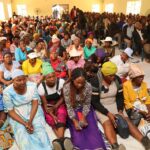THE Second Republic is seized with ensuring all local authorities, regardless of who runs them, become functional and responsive to Zimbabweans’ health needs, as persistent recurrences of avoidable health scares threaten the country’s ambition to become a modern, upper middle-income society by 2030, President Mnangagwa has said.
This comes in light of the latest recurrence of cholera outbreaks owing to maladministration of opposition-run local authorities.
Writing in his weekly article in our sister publication, The Sunday Mail yesterday, President Mnangagwa said public health failures being experienced in the country could have been avoided had the opposition-run councils delivered on their mandate to provide efficient services and amenities.
Consequently, the Head of State and Government said his administration would not hesitate to intervene where local authorities continue showing their incompetence and inability to serve Zimbabweans.
“I am happy that the Ministry of Local Government and Public Works is now seized with this challenge of ensuring all our local authorities, regardless of who controls them, become functional and responsive to the public health needs of residents.
“We have lost enough lives already to hefty public health failures, which could have been prevented by the provision of efficient services and amenities. Government will not hesitate to intervene where local authorities show lacklustre performance, thus endangering our people.
“The same goes for uncollected garbage and broken sewer systems. In the absence of a drastic renovation of all our local authorities in the country, Zimbabwe will continue to suffer periodic outbreaks of preventable diseases, in spite of her many unused water bodies,” he said.
President Mnangagwa said the Second Republic was in the process of completing major dam works including Gwayi-Shangani and Kunzvi dams to meet the country’s water demands.
He said the drilling of 35 000 boreholes across the country’s 35 000 villages would be expedited as Government continues pulling stops to ensure no one and no place is left behind in the country’s development agenda.
Completion of such projects, said the President, would guarantee the defeat of public health scares such as cholera.
“We are completing Gwayi-Shangani Lake; we have started building Kunzvi Dam. Both require efficient, honest municipalities for benefits of such massive water investments to reach each household. Our dysfunctional local authorities have defeated our professed goal of ensuring no one and no community is left behind.
“Now that we have mapped the 35 000 villages in the country, Government needs to speedily roll out a nationwide borehole drilling programme to ensure that each of these 35 000 villages has access to a clean, safe drinking water point that is solar-powered, and to which is attached a community nutritional garden.
“Such a countrywide intervention, which should be completed within a year, guarantees the defeat of cholera, while fortifying nutritional levels in all our communities,” he said.
The President said it was worth noting that the country had managed to mitigate the impact of cholera outbreaks more efficiently than those experienced in previous years, particularly 2008 and 2018.
However, he said, the ultimate goal was to decisively deal with cholera outbreak recurrences altogether.
“I am happy that part of devolution funds allocated to provincial authorities have been channelled towards the construction of more clinics and health centres. The impact of all this is already telling.
“We have been able to contain latest outbreaks of cholera faster than we were able to do in 2008 and 2018.
“The desired end state is where outbreaks are prevented altogether, as more and more of our communities gain access to modern amenities and facilities. Only that way can we boast real, tangible strides towards Vision 2030,” said President Mnangagwa.
“Regarded as easy to cause, and also easy to cure and prevent, recurring incidences of cholera outbreaks in our country are an inexcusable indictment on our poor social services delivery record.”
To this end, President Mnangagwa said service delivery was a solid solution to such outbreaks, more than sole reliance on drugs, clinics and hospitals.
“Cholera breeds faster under conditions of squalor, in the absence of clean drinking water and in circumstances of poor hygiene and sanitation. All these point to poverty-related vulnerabilities, which is why we all need to get concerned and to devise broader interventions beyond the remedial.
“The lasting solution to chronic cholera outbreaks lies more in our service delivery level than in drugs, hospitals and clinics, themselves interventions of cure after preventive methods have already failed,” said the President.
Zimbabwe’s fast growing urban populations, he said, should be matched by the development and availability of modern social amenities and infrastructure.
“Urbanisation in rural Zimbabwe is also picking pace, with our growth points being foremost beachheads for this phenomenon. Rapidly urbanising growth points are now a common feature in all the eight rural provinces.
“Sadly, this rapid pace of rural urbanisation has not been matched by the development of modern amenities and infrastructures that deliver clean, safe drinking water, and which ensure modern and efficient reticulation and waste management technologies and systems.
“Closing this gap is key to guaranteeing viable public health systems for a rapidly urbanising society such as our own,” he said.
The Head of State said a comprehensive national response to global climate change and epidemics had become ever so “needful and urgent”.
If left unchecked, President Mnangagwa said climate change and epidemics would create public health crises.
“This already bad situation has been exacerbated by the global phenomenon of climate change, which is characterised by low rainfall and excessively high temperatures that make the incubation of communicable diseases more likely and their spread more rapid.
“The same phenomenon has translated into an energy supply crisis, particularly in respect of electricity, which is needed to power huge clean water supply systems for our people,” he said.

Follow @MyZimbabweNews











